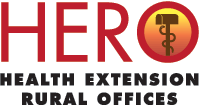 For more information or to get involved, contact:
For more information or to get involved, contact:
Karen Armitage, MD, FAAP
KArmitage@salud.unm.edu
505-272-5377
MSC 09 5065
1 University of New Mexico
Albuquerque, NM 87131
Phone: (505) 272-5377
karmitage@salud.unm.edu
 For more information or to get involved, contact:
For more information or to get involved, contact:
Karen Armitage, MD, FAAP
KArmitage@salud.unm.edu
505-272-5377
MSC 09 5065
1 University of New Mexico
Albuquerque, NM 87131
Phone: (505) 272-5377
karmitage@salud.unm.edu
January 2013 e-news
HEROS and Health Extension
The everyday work of Health Extension is multidimensional. HEROS work with diverse populations in different ways. As a HERO in Bernalillo County, Francisco J. Ronquillo collaborates with a broad spectrum of partners in the community on more than 20 projects and initiatives. Using his expertise in health education with a focus on linguistic and cultural competence, the majority of his work emphasizes improving health disparities for Hispanic/Latino communities in the Albuquerque metropolitan area. Three areas of focus over the past year offer interesting insights into the nature of Health Extension work and the role of HEROs in addressing social determinants to promote broadly based improvements in community health, and all three demonstrate dimensions of work for Health Extension agents that expand the traditional purview of community health work.
HERO-Cooperative Extension Collaboration: Leveraging Infrastructure and Coordinating Resources
A core dimension of Health Extension is connecting and coordinating existing resources, including the infrastructure of the university and the expertise of the HERO. This is evidenced by Francisco’s work to develop a relationship between the HERO initiative at the University of New Mexico (UNM) and Cooperative Extension programs operated through New Mexico State University (NMSU). The collaboration acted to coordinate resources in a manner that leverages strengths of each institution to create new infrastructure in the community. In Francisco’s work as a HERO, he routinely fields requests for information, education and activities related to diabetes and diabetes prevention. Diabetes is a significant health problem in the Albuquerque metropolitan area, particularly of concern in low-income Hispanic neighborhoods. Beginning in 2010, Francisco worked with nutrition educators through the Kitchen Creations and ICAN programs operated by Cooperative Extension to develop opportunities for collaborative work. Kitchen Creations is a 4-class healthy cooking workshop conducted by the NMSU County Home Economist and a paraprofessional nutrition educator and a certified nurse diabetes educator. ICAN provides cooking classes for SNAP/Food Stamp-eligible participants. Both programs have bilingual (Spanish/English) educators available but had difficulty finding Hispanic participants or locations in Hispanic communities where they could conduct classes. Over the past two years, Francisco has developed a variety of collaborative activities involving HEROs and NMSU: (1) A Kitchen Creations “Diabetes Cooking School” program conducted in Spanish at First Choice Clinic that incorporates Department of Health by working with one of their public health nurses that is a Certified Diabetes Educator (CDE); she covers nutrition and treatment of diabetes, presentations by Francisco on diabetes health, and classes by NMSU nutrition educators. Providers from two other local clinics (La Clinica del Valle and Casa de Salud) observed the activities with the idea of expanding the program to new sites; (2) Food Safety Classes at South Valley Multipurpose Senior Center to address concerns that the seniors who attend the Center may not be throwing away spoiled food because of thrifty-minded habits and the fact that many older people have trouble with their sense of smell; (3) Healthy snack preparation classes at the Los Volcanes Senior Center. The nutrition educator taught the seniors how to make healthy snacks and Francisco included information on the physiology of the digestive tract and diabetes health; (4) Healthy growth and development classes (responding to concerns about high teen pregnancy rates and poor nutritional health) for 5th graders at Lavaland ES that included a variety of reproductive and nutrition components conducted over a 1-week period; (5) Presentations on nutrition and diabetes health in Spanish conducted for the Immigrant Coalition through the Partnership for Community Action; (6) Conducted two different diabetes education sessions in Spanish for parents from the Parent Center at Atrisco Heritage Academy Parent Center. For all of these activities, Francisco identified crossover between the programmatic infrastructure and expertise within existing programs, leveraging the strengths of different partners. He focused on health needs across the lifespan and NMSU provided the “how-to” related to food and nutrition. Moreover, Francisco’s emphasis on cultural and linguistic competency ensured that participants understood that the intent is not to change people or their culture, but to add healthier options. The relationship that has developed between UNM HEROs and NMSU Cooperative Extension nutrition programs is bidirectional and serves the interests of both institutions. By developing connections between the organizations and coordinating resources, special needs (presentations and classes conducted in Spanish, specific concerns of Seniors & Youth) were addressed without the need to create new programming.
For more information, contact Francisco Ronquillo at fronquillo@salud.unm.edu or Janet Page-Reeves at jpage-reeves@salud.unm.edu.